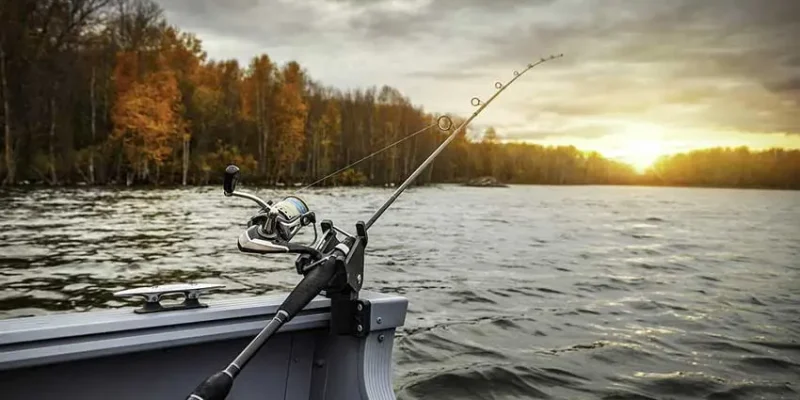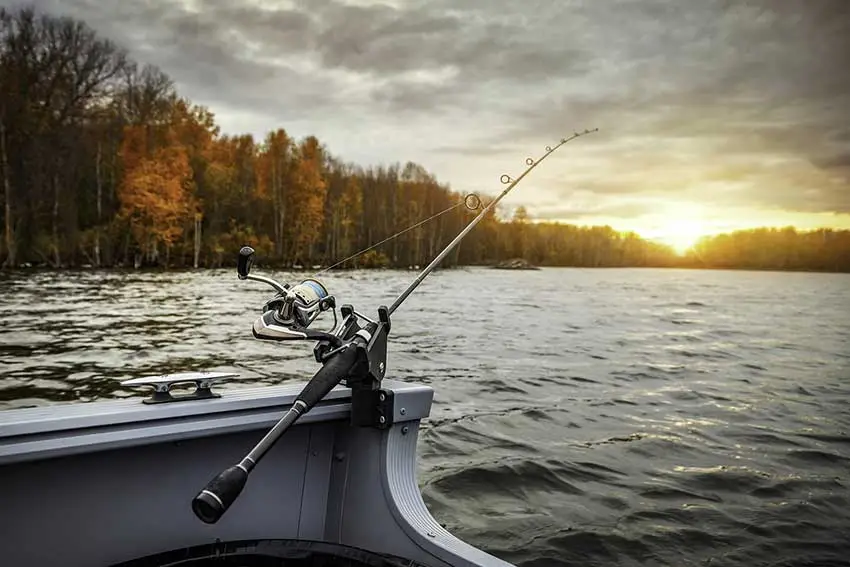The Benefits of Fishing and Why You Should Start Fishing
Fishing offers many benefits that appeal to individuals from all walks of life. Here are some compelling reasons why you should consider taking up Fishing:
1. Stress Relief:
Fishing provides a serene environment away from the hustle and bustle of daily life. The rhythmic casting of the line and the gentle sounds of nature can promote relaxation, reduce stress, and improve mental well-being.
2. Connection with Nature:
You are spending time outdoors while Fishing allows you to immerse yourself in the beauty of nature. Whether by a tranquil lake, a flowing river, or out at sea, you’ll have the opportunity to appreciate the natural world and its inhabitants.
3. Physical Exercise:
Fishing involves various physical activities such as casting, reeling, and maneuvering the catch. While it may not be as intense as some sports, it still offers a good amount of physical exercise, particularly hiking to remote fishing spots or battling with larger fish.
4. Social Bonding:
Fishing is a fantastic way to bond with family and friends. Whether you’re teaching someone how to fish, sharing stories by the water, or enjoying a friendly competition, Fishing fosters meaningful connections and creates lasting memories.
5. Skill Development:
Fishing is a skill-based activity that offers continuous learning opportunities. From mastering different casting techniques to understanding fish behaviour and habitats, there’s always something new to discover and improve upon.
6. Sustainable Food Source:
For those interested in sustainability and self-sufficiency, Fishing can provide a fresh and healthy source of food. Catching your fish allows you to know exactly where your food comes from and can promote a deeper appreciation for the environment and marine ecosystems.
7. Adventure and Exploration:
Whether you’re exploring new fishing spots in your local area or embarking on fishing trips to exotic destinations, Fishing offers a sense of adventure and exploration. Each fishing trip presents new challenges and opportunities for discovery.
8. Environmental Awareness:
Through Fishing, individuals often develop a greater appreciation for the environment and become more aware of the importance of conservation efforts. Responsible fishing practices help preserve aquatic ecosystems and ensure the sustainability of fish populations for future generations.
Overall, Fishing is a rewarding and enjoyable activity that offers numerous physical, mental, and social benefits. Whether you’re a seasoned angler or a complete beginner, there’s something uniquely gratifying about casting a line and immersing yourself in the wonders of the natural world. So why not give Fishing a try and experience its many joys firsthand?
Exploring the Best Age to Start Fishing?
Introducing children to the world of Fishing is a cherished tradition for many families. However, determining the ideal age to start this pastime can vary based on several factors. Let’s delve into the considerations to help you decide when to initiate your child’s angling journey.
Early Beginnings: Ages 4-7
– Introduction to Nature: At this age, children are curious explorers, making it an opportune time to introduce them to the wonders of nature. Fishing outings can serve as valuable opportunities to teach them about ecosystems, aquatic life, and environmental stewardship.
– Basic Skills Development: While motor skills are still developing, children can begin to grasp basic fishing concepts, such as casting, reeling, and baiting hooks. Simple rod-and-reel setups tailored to their size and capabilities are ideal for nurturing their interest and confidence.
Building Foundations: Ages 7-10
– Enhanced Motor Skills: With improved hand-eye coordination and physical strength, children in this age range can refine their fishing techniques and tackle more complex tasks. They may demonstrate more extraordinary patience and focus, making fishing outings more rewarding and enjoyable.
– Learning Patience and Resilience: Fishing teaches valuable life skills such as patience, resilience, and problem-solving. Children learn to cope with setbacks, celebrate successes, and appreciate the intrinsic value of perseverance—a foundation for future endeavours.
Tween Years: Ages 11-13
– Deepening Understanding: As children enter their tween years, they develop a deeper understanding of the natural world and the intricacies of Fishing. They may express interest in learning advanced techniques, experimenting with different baits, and exploring diverse fishing environments.
– Social Engagement: Fishing outings offer opportunities for socialization and bonding with peers. Tween anglers can join fishing clubs, participate in youth fishing tournaments, and engage in mentorship programs to further hone their skills and expand their social networks.
Teenage Exploration: Ages 14-18
– Independence and Responsibility: Teenagers crave independence and autonomy, making fishing an ideal outlet for self-discovery and personal growth. Please encourage them to plan fishing trips, research new fishing spots, and take on leadership roles within fishing communities.
– Environmental Awareness: Adolescence is a critical period for instilling environmental consciousness and fostering a sense of ecological responsibility. Engage teenagers in discussions about conservation, sustainable fishing practices, and the importance of preserving natural habitats for future generations.
While there is no definitive answer to the ideal age to start Fishing, the journey of angling is one of continual learning, growth, and discovery. By considering your child’s developmental stage, interests, and abilities, you can tailor their fishing experiences to cultivate a lifelong passion for the sport and a deep appreciation for the natural world.
How Do I Find a Fishing Spot?
A fishing spot is a place where you can fish. You can usually find Fishing spots near bodies of water, like lakes or rivers.
You can try many ways to search for the perfect fishing spot. One way is to search for (fishing spots near me, freshwater lake map, lake map Canada) on Google Maps and then use the map to determine which area might have some good fishing spots. You can also ask people who live in the area for recommendations on where to go Fishing.
What equipment do I need to Start Fishing?

Starting Fishing requires some vital equipment to get you going. Here’s a list of basic gear:
Fishing Rod and Reel:
The most crucial equipment. There are various types of rods and reels designed for beginners to advanced anglers, and your choice can depend on the kind of Fishing you plan to do (freshwater, saltwater, fly fishing, etc.). A medium-strength, medium-length rod is usually a good starting point for beginners.
Fishing Line:
Your reel may come pre-spooled with line, but it’s good to have extra. Line strength, known as “test,” should match your target fish species and fishing environment.
Hooks:
You’ll need an assortment of hooks for different fish species. Sizes range from very small (size 32) to large (size 19/0). Sizes 6 to 10 are good for starters targeting average-sized fish.
Bait and Lures:
Live bait like worms or minnows is effective for beginners. Artificial lures are also popular and can be specific to the type of fish you’re targeting.
Bobbers (Floats):
Bobbers help you see when fish bite by floating on the water’s surface and moving when a fish takes your bait.
Sinkers:
These are weights used to cast your line more effectively and to sink the bait to the fish.
Swivels:
To prevent line twisting, especially when using certain lures, swivels are a small but crucial piece of gear.
Fishing License:
Most places require you to have a fishing license, so check the regulations in your area before you start.
Tackle Box:
To keep all your gear organized.
Pliers:
For removing hooks from fish or cutting line.
First Aid Kit:
It is always good to have on hand for any minor injuries.
Sun Protection:
Sunglasses, sunscreen, and a hat to protect you from the sun.
Appropriate Clothing:
Depending on the weather and fishing environment, ensure you have suitable clothing, including waterproof gear and durable footwear.
Starting with these basics, you can enjoy Fishing in most environments and for a wide variety of fish. As you gain experience, you may find it beneficial to specialize your equipment for the specific type of Fishing you enjoy most.
How to Catch Fish Easily with the Right Equipment & Techniques?

People have been engaging in fishing activities for centuries. Fishing is a wonderful pastime for many people with family or friends, fishing some catches. You may not know how to start Fishing, but this article will teach you the basics of catching fish.
First, you need to find a good spot for Fishing. Look for areas of water where there is plenty of fish, and they are plentiful.
In the second step, you need to get the right gear and bait. For beginners, it’s best to use small hooks, lures, and small bait like worms or maggots.
Conclusion:
Why You Should Start Fishing Today and How You Can Do So
Fishing is an excellent hobby for all ages. It provides an opportunity to get out of the house and enjoy nature. Fishing is also a great family activity, as anyone of any age can do it. It is also a great way to spend time with friends.
There are many different ways to fish, such as Fishing from shore, Fishing from boats, or Fishing using specialized gear like fly-fishing gear or baitcasting gear.
People can also catch many different types of fish when they go Fishing, such as trout, bass, catfish and salmon.
Fishing continues to be a favourite pastime. You enjoy Fishing, so follow the rules that allow for the continuation of Fishing. Be responsible and courteous of others and your environment. Take time to discover how you can be a better and safer angler.
For your fish and seafood dinner, visit: https://seafoodie.ca/recipes/









